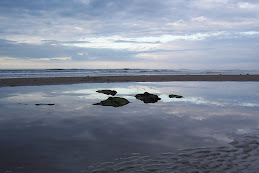I've been having an interesting conversion during my exploration of sonnet writing. Being a child of free verse, I have always thought the sparer the better, write and then take a scalpel to it, keep only what's fore-grounded. However, I have begun to consider the idea of background notes in a sonnet, words which would be cut away as superfluous in free verse, but which offer an on-going tempo. Sometimes the rhythm in a poem needs to be ragged and destabilising, at other times it can be like the underlying beat of feet or drum, giving scaffolding to the melody.
According to Ruth Padel (on Radio 4's "Poetry Workshop", Sunday 25th November 2012) poet Louis MacNeice believed in the need for the containment provided by form poetry and metre. She quoted from his poem "Snow":
World is crazier and more of it than we think,
Incorrigibly plural. I peel and portion
A tangerine and spit the pips and feel
The drunkenness of things being various.
Perhaps the dependable iamb of the sonnet offers a fluted vase for the craziness, a handrail for the appalling drunkenness of the world we poets are attempting in some small way to engage with.
Monday
Last week we took a break in Northumberland which was reviving. This week I'm back to close editing and formatting my book ready for it to go to the proof reader. I do find it difficult not to go completely cross-eyed with it all. At least I have made a decision about the concluding chapter: it will be a poem or nothing. I have sketched out a sonnet, lightly based around Robert Frost's "Stopping in Woods on a Snowy Evening".
My next task is to tackle the index!
My next task is to tackle the index!
Saturday I facilitated my workshop: Healing Words, an introduction to therapeutic creative writing. We were a group of ten, a mix of therapists looking to bring creative writing into their practice and writers working in therapeutic environments. The group was great, hard working, generous and reflective. I certainly enjoyed myself and, from the feedback received, I think everyone went away with something that was useful.
It has made me consider how I might build on this workshop and offer further training. To use a cliché, watch this space...
I, of course, did the writing exercises along with the group and, as always, made my own discoveries. Working with metaphor and emotion I came up with:
Hope is...
the heavy iron triangle,
smooth cool metal,
clanging out into the wilderness.
Strangely, last night I saw Andrew Marr's documentary on Obama "What happened to hope?" (interesting and depressing by turns) and my little stanza seemed even more apt.
It has made me consider how I might build on this workshop and offer further training. To use a cliché, watch this space...
I, of course, did the writing exercises along with the group and, as always, made my own discoveries. Working with metaphor and emotion I came up with:
Hope is...
the heavy iron triangle,
smooth cool metal,
clanging out into the wilderness.
Strangely, last night I saw Andrew Marr's documentary on Obama "What happened to hope?" (interesting and depressing by turns) and my little stanza seemed even more apt.
Subscribe to:
Comments (Atom)

